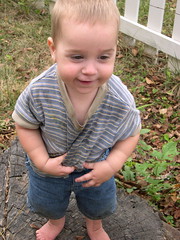My children trust me, normally. If I'm there, in the room with them, they trust me. If I'm gone, fear sets in. For instance, I have taken out the trash some mornings only to discover when I return inside that the yellow-haired child is crying after me - screaming after me. Waking up, she's looked everywhere in the house for me and has been unable to find me. So she assumes that I have left her. She believes that she is alone.
I tell my children that they do not have to be afraid. I tell them that I will not leave them. But they don't learn to trust, to trust me even when I cannot be found, until they have had years and years of experiencing my trustworthiness.
Likewise, God asks us to trust him. But we still find it so difficult, even after years of experience, because we trust him for the wrong things.
Alumni magazines depress me. I get jealous. I get disappointed with what God is doing in my life. I expect more - fame, success, affluence, a job, fame.
A friend of mine and his family is moving. Within a short period of time, a very short period of time, he has a promising interview and several contacts - good news. I rejoice with him, but I also am jealous. I get disappointed that after a year and a half I have only had three interviews. I get disappointed with what God is doing in my life. I get disappointed that God is doing something other in my life.
I saw some old friends that I used to work with last night while we were trick-or-treating. "So what are you doing now?" I don't have a job, if that is what you mean. Not a job that I get paid for. Well, I have a couple of writing gigs that bring in money for bubblegum and shoelaces. Oh, and I make a mean box of macaroni-and-cheese and I wipe asses and powder buns with the best of them.
I shave my head. I grow a beard. I walk around in my pajamas half of every day.
Is this what God wants me to be doing? Is God doing in my life what he has always wanted to do in my life - what he has always dreamed of doing in my life? Why are my dreams for my life so different?
And while I'm becoming depressed about how my life has turned out, here's the thing that gets my goat: I love making macaroni-and-cheese and wiping asses. I love freelance writing and walking around in my pajamas half of every day. I love growing a beard. I love not sitting in a cubicle all day long. I love the spiritual path God has placed me on.
But I struggle with not being a provider, the provider. It's a struggle with my being a man, a husband, and a father; it's a struggle with my culture. And sometimes it just hurts deep in my soul. Partly because it was not my choice to stay at home. Mostly because it wounds my pride. It ruins my pride. Not enough, not yet, and that's why it is still so painful.
And yet God's dreams for me are being birthed in these runny noses and this messiness. His divine imagination is becoming the flesh on my bones and the shoes on my feet. All my education and experience and life are not converging into the job of my dreams. My life is converging onto a path altogether different from anything I ever imagined. It is a path of divine dreams. And maybe, just maybe, I'm beginning to trust in the dreams of God.
